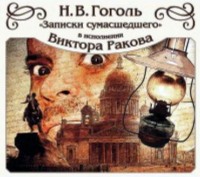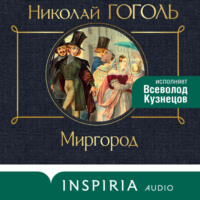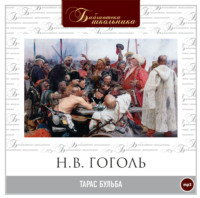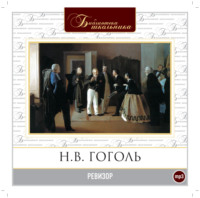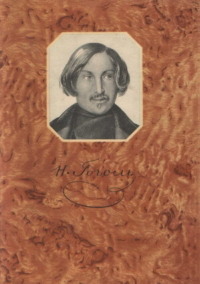 полная версия
полная версияTaras Bulba, and Other Tales
It must be mentioned that the prominent personage was no longer a young man, but a good husband and respected father of a family. Two sons, one of whom was already in the service, and a good-looking, sixteen-year-old daughter, with a rather retrousse but pretty little nose, came every morning to kiss his hand and say, “Bonjour, papa.” His wife, a still fresh and good-looking woman, first gave him her hand to kiss, and then, reversing the procedure, kissed his. But the prominent personage, though perfectly satisfied in his domestic relations, considered it stylish to have a friend in another quarter of the city. This friend was scarcely prettier or younger than his wife; but there are such puzzles in the world, and it is not our place to judge them. So the important personage descended the stairs, stepped into his sledge, said to the coachman, “To Karolina Ivanovna’s,” and, wrapping himself luxuriously in his warm cloak, found himself in that delightful frame of mind than which a Russian can conceive no better, namely, when you think of nothing yourself, yet when the thoughts creep into your mind of their own accord, each more agreeable than the other, giving you no trouble either to drive them away or seek them. Fully satisfied, he recalled all the gay features of the evening just passed, and all the mots which had made the little circle laugh. Many of them he repeated in a low voice, and found them quite as funny as before; so it is not surprising that he should laugh heartily at them. Occasionally, however, he was interrupted by gusts of wind, which, coming suddenly, God knows whence or why, cut his face, drove masses of snow into it, filled out his cloak-collar like a sail, or suddenly blew it over his head with supernatural force, and thus caused him constant trouble to disentangle himself.
Suddenly the important personage felt some one clutch him firmly by the collar. Turning round, he perceived a man of short stature, in an old, worn uniform, and recognised, not without terror, Akakiy Akakievitch. The official’s face was white as snow, and looked just like a corpse’s. But the horror of the important personage transcended all bounds when he saw the dead man’s mouth open, and, with a terrible odour of the grave, gave vent to the following remarks: “Ah, here you are at last! I have you, that—by the collar! I need your cloak; you took no trouble about mine, but reprimanded me; so now give up your own.”
The pallid prominent personage almost died of fright. Brave as he was in the office and in the presence of inferiors generally, and although, at the sight of his manly form and appearance, every one said, “Ugh! how much character he had!” at this crisis, he, like many possessed of an heroic exterior, experienced such terror, that, not without cause, he began to fear an attack of illness. He flung his cloak hastily from his shoulders and shouted to his coachman in an unnatural voice, “Home at full speed!” The coachman, hearing the tone which is generally employed at critical moments and even accompanied by something much more tangible, drew his head down between his shoulders in case of an emergency, flourished his whip, and flew on like an arrow. In a little more than six minutes the prominent personage was at the entrance of his own house. Pale, thoroughly scared, and cloakless, he went home instead of to Karolina Ivanovna’s, reached his room somehow or other, and passed the night in the direst distress; so that the next morning over their tea his daughter said, “You are very pale to-day, papa.” But papa remained silent, and said not a word to any one of what had happened to him, where he had been, or where he had intended to go.
This occurrence made a deep impression upon him. He even began to say: “How dare you? do you realise who stands before you?” less frequently to the under-officials, and if he did utter the words, it was only after having first learned the bearings of the matter. But the most noteworthy point was, that from that day forward the apparition of the dead tchinovnik ceased to be seen. Evidently the prominent personage’s cloak just fitted his shoulders; at all events, no more instances of his dragging cloaks from people’s shoulders were heard of. But many active and apprehensive persons could by no means reassure themselves, and asserted that the dead tchinovnik still showed himself in distant parts of the city.
In fact, one watchman in Kolomna saw with his own eyes the apparition come from behind a house. But being rather weak of body, he dared not arrest him, but followed him in the dark, until, at length, the apparition looked round, paused, and inquired, “What do you want?” at the same time showing a fist such as is never seen on living men. The watchman said, “It’s of no consequence,” and turned back instantly. But the apparition was much too tall, wore huge moustaches, and, directing its steps apparently towards the Obukhoff bridge, disappeared in the darkness of the night.
HOW THE TWO IVANS QUARRELLED
CHAPTER I
IVAN IVANOVITCH AND IVAN NIKIFOROVITCH
A fine pelisse has Ivan Ivanovitch! splendid! And what lambskin! deuce take it, what lambskin! blue-black with silver lights. I’ll forfeit, I know not what, if you find any one else owning such a one. Look at it, for heaven’s sake, especially when he stands talking with any one! look at him side-ways: what a pleasure it is! To describe it is impossible: velvet! silver! fire! Nikolai the Wonder-worker, saint of God! why have I not such a pelisse? He had it made before Agafya Fedosyevna went to Kief. You know Agafya Fedosyevna who bit the assessor’s ear off?
Ivan Ivanovitch is a very handsome man. What a house he has in Mirgorod! Around it on every side is a balcony on oaken pillars, and on the balcony are benches. Ivan Ivanovitch, when the weather gets too warm, throws off his pelisse and his remaining upper garments, and sits, in his shirt sleeves, on the balcony to observe what is going on in the courtyard and the street. What apples and pears he has under his very windows! You have but to open the window and the branches force themselves through into the room. All this is in front of the house; but you should see what he has in the garden. What is there not there? Plums, cherries, every sort of vegetable, sunflowers, cucumbers, melons, peas, a threshing-floor, and even a forge.
A very fine man, Ivan Ivanovitch! He is very fond of melons: they are his favourite food. As soon as he has dined, and come out on his balcony, in his shirt sleeves, he orders Gapka to bring two melons, and immediately cuts them himself, collects the seeds in a paper, and begins to eat. Then he orders Gapka to fetch the ink-bottle, and, with his own hand, writes this inscription on the paper of seeds: “These melons were eaten on such and such a date.” If there was a guest present, then it reads, “Such and such a person assisted.”
The late judge of Mirgorod always gazed at Ivan Ivanovitch’s house with pleasure. The little house is very pretty. It pleases me because sheds and other little additions are built on to it on all sides; so that, looking at it from a distance, only roofs are visible, rising one above another, and greatly resembling a plate full of pancakes, or, better still, fungi growing on the trunk of a tree. Moreover, the roof is all overgrown with weeds: a willow, an oak, and two apple-trees lean their spreading branches against it. Through the trees peep little windows with carved and white-washed shutters, which project even into the street.
A very fine man, Ivan Ivanovitch! The commissioner of Poltava knows him too. Dorosh Tarasovitch Pukhivotchka, when he leaves Khorola, always goes to his house. And when Father Peter, the Protopope who lives at Koliberdas, invites a few guests, he always says that he knows of no one who so well fulfils all his Christian duties and understands so well how to live as Ivan Ivanovitch.
How time flies! More than ten years have already passed since he became a widower. He never had any children. Gapka has children and they run about the court-yard. Ivan Ivanovitch always gives each of them a cake, or a slice of melon, or a pear.
Gapka carries the keys of the storerooms and cellars; but the key of the large chest which stands in his bedroom, and that of the centre storeroom, Ivan Ivanovitch keeps himself; Gapka is a healthy girl, with ruddy cheeks and calves, and goes about in coarse cloth garments.
And what a pious man is Ivan Ivanovitch! Every Sunday he dons his pelisse and goes to church. On entering, he bows on all sides, generally stations himself in the choir, and sings a very good bass. When the service is over, Ivan Ivanovitch cannot refrain from passing the poor people in review. He probably would not have cared to undertake this tiresome work if his natural goodness had not urged him to it. “Good-day, beggar!” he generally said, selecting the most crippled old woman, in the most patched and threadbare garments. “Whence come you, my poor woman?”
“I come from the farm, sir. ‘Tis two days since I have eaten or drunk: my own children drove me out.”
“Poor soul! why did you come hither?”
“To beg alms, sir, to see whether some one will not give me at least enough for bread.”
“Hm! so you want bread?” Ivan Ivanovitch generally inquired.
“How should it be otherwise? I am as hungry as a dog.”
“Hm!” replied Ivan Ivanovitch usually, “and perhaps you would like butter too?”
“Yes; everything which your kindness will give; I will be content with all.”
“Hm! Is butter better than bread?”
“How is a hungry person to choose? Anything you please, all is good.” Thereupon the old woman generally extended her hand.
“Well, go with God’s blessing,” said Ivan Ivanovitch. “Why do you stand there? I’m not beating you.” And turning to a second and a third with the same questions, he finally returns home, or goes to drink a little glass of vodka with his neighbour, Ivan Nikiforovitch, or the judge, or the chief of police.
Ivan Ivanovitch is very fond of receiving presents. They please him greatly.
A very fine man too is Ivan Nikiforovitch. They are such friends as the world never saw. Anton Prokofievitch Pupopuz, who goes about to this hour in his cinnamon-coloured surtout with blue sleeves and dines every Sunday with the judge, was in the habit of saying that the Devil himself had bound Ivan Ivanovitch and Ivan Nikiforovitch together with a rope: where one went, the other followed.
Ivan Nikiforovitch has never married. Although it was reported that he was married it was completely false. I know Ivan Nikiforovitch very well, and am able to state that he never even had any intention of marrying. Where do all these scandals originate? In the same way it was rumoured that Ivan Nikiforovitch was born with a tail! But this invention is so clumsy and at the same time so horrible and indecent that I do not even consider it necessary to refute it for the benefit of civilised readers, to whom it is doubtless known that only witches, and very few even of these, have tails. Witches, moreover, belong more to the feminine than to the masculine gender.
In spite of their great friendship, these rare friends are not always agreed between themselves. Their characters can best be judged by comparing them. Ivan Ivanovitch has the usual gift of speaking in an extremely pleasant manner. Heavens! How he does speak! The feeling can best be described by comparing it to that which you experience when some one combs your head or draws his finger softly across your heel. You listen and listen until you drop your head. Pleasant, exceedingly pleasant! like the sleep after a bath. Ivan Nikiforovitch, on the contrary, is more reticent; but if he once takes up his parable, look out for yourself! He can talk your head off.
Ivan Ivanovitch is tall and thin: Ivan Nikiforovitch is rather shorter in stature, but he makes it up in thickness. Ivan Ivanovitch’s head is like a radish, tail down; Ivan Nikiforovitch’s like a radish with the tail up. Ivan Ivanovitch lolls on the balcony in his shirt sleeves after dinner only: in the evening he dons his pelisse and goes out somewhere, either to the village shop, where he supplies flour, or into the fields to catch quail. Ivan Nikiforovitch lies all day at his porch: if the day is not too hot he generally turns his back to the sun and will not go anywhere. If it happens to occur to him in the morning he walks through the yard, inspects the domestic affairs, and retires again to his room. In early days he used to call on Ivan Ivanovitch. Ivan Ivanovitch is a very refined man, and never utters an impolite word. Ivan Nikiforovitch is not always on his guard. On such occasions Ivan Ivanovitch usually rises from his seat, and says, “Enough, enough, Ivan Nikiforovitch! It’s better to go out at once than to utter such godless words.”
Ivan Ivanovitch gets into a terrible rage if a fly falls into his beet-soup. Then he is fairly beside himself; he flings away his plate and the housekeeper catches it. Ivan Nikiforovitch is very fond of bathing; and when he gets up to the neck in water, orders a table and a samovar, or tea urn, to be placed on the water, for he is very fond of drinking tea in that cool position. Ivan Ivanovitch shaves twice a week; Ivan Nikiforovitch once. Ivan Ivanovitch is extremely curious. God preserve you if you begin to tell him anything and do not finish it! If he is displeased with anything he lets it be seen at once. It is very hard to tell from Ivan Nikiforovitch’s countenance whether he is pleased or angry; even if he is rejoiced at anything, he will not show it. Ivan Ivanovitch is of a rather timid character: Ivan Nikiforovitch, on the contrary, has, as the saying is, such full folds in his trousers that if you were to inflate them you might put the courtyard, with its storehouses and buildings, inside them.
Ivan Ivanovitch has large, expressive eyes, of a snuff colour, and a mouth shaped something like the letter V; Ivan Nikiforovitch has small, yellowish eyes, quite concealed between heavy brows and fat cheeks; and his nose is the shape of a ripe plum. If Ivanovitch treats you to snuff, he always licks the cover of his box first with his tongue, then taps on it with his finger and says, as he raises it, if you are an acquaintance, “Dare I beg you, sir, to give me the pleasure?” if a stranger, “Dare I beg you, sir, though I have not the honour of knowing your rank, name, and family, to do me the favour?” but Ivan Nikiforovitch puts his box straight into your hand and merely adds, “Do me the favour.” Neither Ivan Ivanovitch nor Ivan Nikiforovitch loves fleas; and therefore, neither Ivan Ivanovitch nor Ivan Nikiforovitch will, on no account, admit a Jew with his wares, without purchasing of him remedies against these insects, after having first rated him well for belonging to the Hebrew faith.
But in spite of numerous dissimilarities, Ivan Ivanovitch and Ivan Nikiforovitch are both very fine fellows.
CHAPTER II
FROM WHICH MAY BE SEEN WHENCE AROSE THE DISCUSSION BETWEEN IVAN IVANOVITCH AND IVAN NIKIFOROVITCH
One morning—it was in July—Ivan Ivanovitch was lying on his balcony. The day was warm; the air was dry, and came in gusts. Ivan Ivanovitch had been to town, to the mower’s, and at the farm, and had succeeded in asking all the muzhiks and women whom he met all manner of questions. He was fearfully tired and had laid down to rest. As he lay there, he looked at the storehouse, the courtyard, the sheds, the chickens running about, and thought to himself, “Heavens! What a well-to-do man I am! What is there that I have not? Birds, buildings, granaries, everything I take a fancy to; genuine distilled vodka; pears and plums in the orchard; poppies, cabbages, peas in the garden; what is there that I have not? I should like to know what there is that I have not?”
As he put this question to himself, Ivan Ivanovitch reflected; and meantime his eyes, in their search after fresh objects, crossed the fence into Ivan Nikiforovitch’s yard and involuntarily took note of a curious sight. A fat woman was bringing out clothes, which had been packed away, and spreading them out on the line to air. Presently an old uniform with worn trimmings was swinging its sleeves in the air and embracing a brocade gown; from behind it peeped a court-coat, with buttons stamped with coats-of-arms, and moth-eaten collar; and white kersymere pantaloons with spots, which had once upon a time clothed Ivan Nikiforovitch’s legs, and might now possibly fit his fingers. Behind them were speedily hung some more in the shape of the letter pi. Then came a blue Cossack jacket, which Ivan Nikiforovitch had had made twenty years before, when he was preparing to enter the militia, and allowed his moustache to grow. And one after another appeared a sword, projecting into the air like a spit, and the skirts of a grass-green caftan-like garment, with copper buttons the size of a five-kopek piece, unfolded themselves. From among the folds peeped a vest bound with gold, with a wide opening in front. The vest was soon concealed by an old petticoat belonging to his dead grandmother, with pockets which would have held a water-melon.
All these things piled together formed a very interesting spectacle for Ivan Ivanovitch; while the sun’s rays, falling upon a blue or green sleeve, a red binding, or a scrap of gold brocade, or playing in the point of a sword, formed an unusual sight, similar to the representations of the Nativity given at farmhouses by wandering bands; particularly that part where the throng of people, pressing close together, gaze at King Herod in his golden crown or at Anthony leading his goat.
Presently the old woman crawled, grunting, from the storeroom, dragging after her an old-fashioned saddle with broken stirrups, worn leather holsters, and saddle-cloth, once red, with gilt embroidery and copper disks.
“Here’s a stupid woman,” thought Ivan Ivanovitch. “She’ll be dragging Ivan Nikiforovitch out and airing him next.”
Ivan Ivanovitch was not so far wrong in his surmise. Five minutes later, Ivan Nikiforovitch’s nankeen trousers appeared, and took nearly half the yard to themselves. After that she fetched out a hat and a gun. “What’s the meaning of this?” thought Ivan Ivanovitch. “I never knew Ivan Nikiforovitch had a gun. What does he want with it? Whether he shoots, or not, he keeps a gun! Of what use is it to him? But it’s a splendid thing. I have long wanted just such a one. I should like that gun very much: I like to amuse myself with a gun. Hello, there, woman, woman!” shouted Ivan Ivanovitch, beckoning to her.
The old woman approached the fence.
“What’s that you have there, my good woman?”
“A gun, as you see.”
“What sort of a gun?”
“Who knows what sort of a gun? If it were mine, perhaps I should know what it is made of; but it is my master’s, therefore I know nothing of it.”
Ivan Ivanovitch rose, and began to examine the gun on all sides, and forgot to reprove the old woman for hanging it and the sword out to air.
“It must be iron,” went on the old woman.
“Hm, iron! why iron?” said Ivan Ivanovitch. “Has your master had it long?”
“Yes; long, perhaps.”
“It’s a nice gun!” continued Ivan Ivanovitch. “I will ask him for it. What can he want with it? I’ll make an exchange with him for it. Is your master at home, my good woman?”
“Yes.”
“What is he doing? lying down?”
“Yes, lying down.”
“Very well, I will come to him.”
Ivan Ivanovitch dressed himself, took his well-seasoned stick for the benefit of the dogs, for, in Mirgorod, there are more dogs than people to be met in the street, and went out.
Although Ivan Nikiforovitch’s house was next door to Ivan Ivanovitch’s, so that you could have got from one to the other by climbing the fence, yet Ivan Ivanovitch went by way of the street. From the street it was necessary to turn into an alley which was so narrow that if two one-horse carts chanced to meet they could not get out, and were forced to remain there until the drivers, seizing the hind-wheels, dragged them back in opposite directions into the street, whilst pedestrians drew aside like flowers growing by the fence on either hand. Ivan Ivanovitch’s waggon-shed adjoined this alley on one side; and on the other were Ivan Nikiforovitch’s granary, gate, and pigeon-house.
Ivan Ivanovitch went up to the gate and rattled the latch. Within arose the barking of dogs; but the motley-haired pack ran back, wagging their tails when they saw the well-known face. Ivan Ivanovitch traversed the courtyard, in which were collected Indian doves, fed by Ivan Nikiforovitch’s own hand, melon-rinds, vegetables, broken wheels, barrel-hoops, and a small boy wallowing with dirty blouse—a picture such as painters love. The shadows of the fluttering clothes covered nearly the whole of the yard and lent it a degree of coolness. The woman greeted him with a bend of her head and stood, gaping, in one spot. The front of the house was adorned with a small porch, with its roof supported on two oak pillars—a welcome protection from the sun, which at that season in Little Russia loves not to jest, and bathes the pedestrian from head to foot in perspiration. It may be judged how powerful Ivan Ivanovitch’s desire to obtain the coveted article was when he made up his mind, at such an hour, to depart from his usual custom, which was to walk abroad only in the evening.
The room which Ivan Ivanovitch entered was quite dark, for the shutters were closed; and the ray of sunlight passing through a hole made in one of them took on the colours of the rainbow, and, striking the opposite wall, sketched upon it a parti-coloured picture of the outlines of roofs, trees, and the clothes suspended in the yard, only upside down. This gave the room a peculiar half-light.
“God assist you!” said Ivan Ivanovitch.
“Ah! how do you do, Ivan Ivanovitch?” replied a voice from the corner of the room. Then only did Ivan Ivanovitch perceive Ivan Nikiforovitch lying upon a rug which was spread on the floor. “Excuse me for appearing before you in a state of nature.”
“Not at all. You have been asleep, Ivan Nikiforovitch?”
“I have been asleep. Have you been asleep, Ivan Ivanovitch?”
“I have.”
“And now you have risen?”
“Now I have risen. Christ be with you, Ivan Nikiforovitch! How can you sleep until this time? I have just come from the farm. There’s very fine barley on the road, charming! and the hay is tall and soft and golden!”
“Gorpina!” shouted Ivan Nikiforovitch, “fetch Ivan Ivanovitch some vodka, and some pastry and sour cream!”
“Fine weather we’re having to-day.”
“Don’t praise it, Ivan Ivanovitch! Devil take it! You can’t get away from the heat.”
“Now, why need you mention the devil! Ah, Ivan Nikiforovitch! you will recall my words when it’s too late. You will suffer in the next world for such godless words.”
“How have I offended you, Ivan Ivanovitch? I have not attacked your father nor your mother. I don’t know how I have insulted you.”
“Enough, enough, Ivan Nikiforovitch!”
“By Heavens, Ivan Ivanovitch, I did not insult you!”
“It’s strange that the quails haven’t come yet to the whistle.”
“Think what you please, but I have not insulted you in any way.”
“I don’t know why they don’t come,” said Ivan Ivanovitch, as if he did not hear Ivan Nikiforovitch; “it is more than time for them already; but they seem to need more time for some reason.”
“You say that the barley is good?”
“Splendid barley, splendid!”
A silence ensued.
“So you are having your clothes aired, Ivan Nikiforovitch?” said Ivan Ivanovitch at length.
“Yes; those cursed women have ruined some beautiful clothes; almost new they were too. Now I’m having them aired; the cloth is fine and good. They only need turning to make them fit to wear again.”
“One thing among them pleased me extremely, Ivan Nikiforovitch.”
“What was that?”
“Tell me, please, what use do you make of the gun that has been put to air with the clothes?” Here Ivan Ivanovitch offered his snuff. “May I ask you to do me the favour?”
“By no means! take it yourself; I will use my own.” Thereupon Ivan Nikiforovitch felt about him, and got hold of his snuff-box. “That stupid woman! So she hung the gun out to air. That Jew at Sorotchintzi makes good snuff. I don’t know what he puts in it, but it is so very fragrant. It is a little like tansy. Here, take a little and chew it; isn’t it like tansy?”
“Ivan Nikiforovitch, I want to talk about that gun; what are you going to do with it? You don’t need it.”


